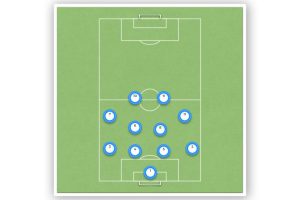Managing Anxiety And Stress In Soccer
As a mental health and wellness specialist in soccer, I am often asked about how to manage anxiety and stress that comes with the sport. Anxiety and stress can be overwhelming for soccer players, especially when competing at an elite level. It’s important for athletes to know strategies for managing these feelings so they can stay focused on their performance. In this article, I will discuss some effective methods of managing anxiety and stress in soccer.
The first step in managing anxiety and stress is recognizing it. Soccer players should be aware of their own emotional reactions while playing, such as feeling anxious or stressed out before or during a game. Once they understand how they’re feeling, they can begin to find ways to cope with it. There are many different techniques that athletes can use to help them deal with these emotions on the field, such as deep breathing exercises, visualization techniques, and positive self-talk.
Finally, coaches should also be aware of the signs of anxiety and stress in their players so they can offer support where needed. Good communication between coaches and players is key; coaches should create a safe space where their athletes feel comfortable discussing any issues that arise so they can get help if needed. With the proper guidance from coaches and teammates, soccer players can learn to effectively manage their anxiety and stress levels so it doesn’t interfere with their performance on the field.
Definition Of Anxiety And Stress
Have you ever felt overwhelmed, scared, or worried? Those feelings could be symptoms of anxiety and stress. So what are anxiety and stress exactly? Anxiety is a feeling of fear and worry that can be caused by uncertainty or a perceived threat. Stress is the body’s response to changes in the environment, both physical and mental. It is important to understand the definition of both anxiety and stress in order to properly manage them in soccer.
Mental health and emotional well-being are an integral part of a soccer player’s performance on the field. A person’s mental state can greatly impact their ability to play soccer successfully. Therefore, it is essential for players to recognize when they are experiencing anxiety or stress so they can take actionable steps towards managing them effectively. Knowing how to identify these feelings can help players develop better strategies for managing their mental health while playing soccer.
Understanding The Causes Of Anxiety And Stress In Soccer
Having established the definition of anxiety and stress, it is now time to explore what causes these feelings in soccer players. Anxiety and stress can be caused by a variety of factors, all of which can have a profound effect on an athlete’s performance.
The most common causes of anxiety in soccer are fear of failure, fear of the unknown, and high expectations. Fear of failure is especially prevalent when players feel pressure to succeed or when they have experienced failure in the past. Fear of the unknown may arise when athletes face unfamiliar opponents or playing environments. High expectations from coaches and parents can also lead to heightened levels of stress for soccer players.
Physical fatigue is another major cause of anxiety and stress in soccer. Soccer is a physically demanding sport that often requires long periods without rest or recovery time. This leads to physical exhaustion, which can result in increased levels of anxiety for athletes who are trying to perform at their best during practices and games. Mental fatigue cannot be discounted either – prolonged periods without adequate sleep or mental breaks can make it difficult for soccer players to remain focused on the field.
In addition, poor nutrition, dehydration, lack of proper training techniques and social pressure from teammates can all contribute to heightened levels of anxiety and stress among soccer players. It is important to note that all these factors play a role in developing an environment where athletes feel safe and supported while competing on the pitch.
The effects that these causes have on a player’s mental health should not be taken lightly; left unchecked, they could lead to serious setbacks in an athlete’s performance as well as their overall wellbeing. With this understanding, it becomes clear why managing anxiety and stress should be an integral part of any successful soccer program.
Coping Strategies For Soccer Players
Playing soccer can be an incredibly rewarding experience, but it can also be a source of stress and anxiety. As a mental health and wellness specialist in soccer, I have seen firsthand how difficult it is for players to manage their emotions while playing. To help soccer players cope with their anxiety and stress, there are several effective strategies that they can use.
Soccer coping strategies involve both physical and mental techniques. Physically, players should take regular breaks during practices and games to prevent over-exertion and overextending themselves. They should also focus on breathing exercises to help relax their bodies and minds before or during matches. Mentally, players should practice positive self-talk to boost their confidence before competitions, as well as engage in meaningful conversations with their teammates or coaches afterwards to share experiences. Additionally, players should make sure to get plenty of restful sleep every night in order to remain mentally sharp during the day.
These soccer strategies for managing stress and anxiety will not only help players excel on the field, but will also equip them with important skills to cope with difficult situations throughout life. By learning these coping techniques, soccer players can build resilience and gain more control over their emotions so they can perform at their best when competing.
Cognitive Behavioral Therapy Techniques
Cognitive Behavioral Therapy (CBT) is a popular and effective approach to managing anxiety and stress in soccer. CBT techniques can help soccer players understand the underlying causes of their distress and reframe the way they think about it. Through this process, players can develop healthier habits for dealing with challenging situations.
CBT techniques such as identifying negative thought patterns, challenging irrational beliefs, and developing positive self-talk are all widely used by mental health professionals to help manage anxiety in athletes. By becoming aware of personal triggers for anxiety or stress, players can also create plans ahead of time to address potential issues that may arise during a game or practice session. Additionally, cognitive restructuring helps players recognize when they are feeling overwhelmed and provides them with alternative strategies to cope with the situation.
Soccer players can benefit from CBT by learning how to manage their emotions more effectively and become more resilient against stressors. With regular practice, CBT techniques can help foster long-term changes in behavior that lead to improved performance on the field as well as better mental wellness overall. The goal is for athletes to be able to recognize their triggers and take control of their emotional responses so that they can perform at their best without succumbing to anxieties or fears.
Relaxation Exercises For Soccer Players
Relaxation exercises are an essential tool for soccer players in managing stress and anxiety. As a mental health and wellness specialist in soccer, it is important to provide guidance in order to ensure that players can use these methods of relief effectively. Here are four relaxation exercises that will help soccer players manage stress and improve their mental health:
- Take deep breaths: Deep breathing helps relax the body and mind, allowing for better concentration on the present moment.
- Visualize success: Have players visualize themselves succeeding in their upcoming game or practice session to boost confidence and reduce anxiety levels.
- Practice mindfulness: Mindfulness helps bring focus to the present moment and allows players to be aware of their thoughts, feelings, and body sensations without judgment or criticism.
- Stretch: Stretching is a great way to relieve tension and increase flexibility while improving physical performance on the field.
These relaxation exercises can help soccer players manage stress, reduce anxiety levels, and improve their overall mental health so they can perform at their best during practices and games. With proper guidance from mental health professionals, these techniques can be used by players on a regular basis for maximum benefit.
The Role Of Nutrition In Managing Anxiety And Stress In Soccer
Good nutrition is essential for any athlete, but it plays an especially important role in managing anxiety and stress in soccer. Proper soccer nutrition provides the necessary energy for players to compete at their best, and helps them maintain their mental focus. Soccer nutrition also helps athletes control their stress levels and manage their emotions during games and practices.
Research has shown that a deficiency in certain nutrients can lead to increased levels of anxiety, while adequate intake of these nutrients can help to reduce stress. Nutrients such as omega-3 fatty acids, vitamin B6, magnesium, and zinc are particularly beneficial for soccer players trying to manage anxiety and stress. Eating foods rich in these nutrients, such as salmon, nuts, spinach, eggs and bananas can help athletes keep their emotional state balanced and increase their ability to cope with stressful situations on the field.
In addition to ensuring adequate nutrient intake from food sources, athletes should also consider taking high-quality dietary supplements specifically designed for optimal sports performance. Supplements that contain a blend of vitamins, minerals, amino acids and herbs may be beneficial in helping soccer players stay mentally sharp and reduce the effects of stress during competition. By incorporating good nutrition into their daily routine, soccer players can maximize their physical performance while maintaining a healthy mental balance.
Benefits Of Exercise For Soccer Players With Anxiety And Stress
Exercise can be a great tool for soccer players struggling with anxiety and stress. The physical and mental benefits of exercise have been well documented, and can be incredibly helpful in managing the symptoms associated with these mental health issues. Soccer players can reap these same rewards from committing to regular exercise.
Exercise provides a distraction from worrying thoughts, as it forces your mind to focus on the task at hand rather than ruminating on negative feelings. It also helps release feel-good hormones in the body like endorphins, which promote relaxation and reduce feelings of stress or anxiety. In addition to helping manage symptoms, exercise can help soccer players develop healthy lifestyle changes that will benefit them both physically and mentally in the long run.
Regular physical activity has been linked to improved sleep quality, which is essential for maintaining good physical and mental health. Exercise can also help improve energy levels, self-confidence, concentration, motivation and overall mood. All of these positive outcomes are beneficial for anyone dealing with anxiety or stress. Soccer players who incorporate exercise into their daily routine may find it easier to manage their anxieties and stresses more effectively over time.
Practicing Mindfulness And Meditation
When it comes to managing anxiety and stress in soccer, mindfulness and meditation can be incredibly effective tools. Just ask David Beckham, former Manchester United midfielder and England Captain, who credits his mindfulness practice with helping him manage the pressures of being a professional athlete. He says he “used to lie awake at night worrying about what might happen on the pitch or off the field” before turning to meditation.
Mindfulness is defined as bringing one’s attention to the present moment without judgment. It can help players become more aware of their thought patterns and feelings around performance, allowing them to respond more effectively rather than react instinctively. Similarly, meditation helps players tap into their inner resources and gain control over their mental game by cultivating an awareness of the body and mind connection.
Here are some ways soccer players can incorporate mindfulness and meditation into their everyday routine:
- Create a space for reflection and relaxation – this could involve setting aside time for yourself each day that you dedicate solely to mindfulness or mediation practices
- Practice mindful breathing – take a few moments throughout your day to focus on your breath as you inhale deeply through your nose and exhale slowly out of your mouth
- Incorporate mindful movement – yoga, tai chi, or simply going for a walk can help you stay connected with both your body and mind while reducing anxiety levels
Through regular practice of these techniques, soccer players will be able to better cope with anxious thoughts related to playing the game they love. Mindfulness and meditation provide an opportunity for athletes to pause during stressful situations in order to gain clarity on how best to handle them. With consistent dedication, these powerful tools can help soccer players find success both on and off the field.
Seeking Professional Help
When it comes to managing anxiety and stress in soccer, seeking professional help can be a valuable step. Professional help can come in many forms, such as counseling, therapy, or coaching. Soccer players who are feeling overwhelmed by their anxiety and stress should seriously consider talking to an expert.
A mental health professional can provide personalized guidance tailored to the individual’s needs. They can work with soccer players to identify the source of their anxiety and develop strategies for managing it. Additionally, they can assist with developing coping mechanisms for stressful situations and preventing further flare-ups.
In short, seeking professional help is an important part of managing anxiety and stress in soccer. A mental health specialist can provide invaluable support that helps individuals not only manage their symptoms but also take proactive steps towards leading a healthier lifestyle overall.
Making Lifestyle Changes To Manage Anxiety And Stress
When it comes to managing anxiety and stress in soccer, lifestyle changes can be incredibly beneficial. It is essential for players to develop healthy habits that can help them reduce their stress levels and gain relief from their anxiety. From getting enough sleep to eating nutritious meals, there are a number of lifestyle changes that can produce positive results.
Players should aim to maintain consistent sleep patterns, as this can aid in the production of serotonin and other hormones which reduce feelings of stress and anxiety. Additionally, taking the time to eat healthy meals that include a variety of fruits, vegetables, complex carbohydrates, lean proteins, and healthy fats will increase energy levels and improve overall physical health in athletes. Regular exercise also helps to improve mental health as it releases endorphins which boost moods and confidence. Furthermore, activities such as yoga or mediation can aid in relaxation which reduces tension due to the increased control over breathing that they provide.
Developing healthy habits like these can significantly reduce anxiety and stress levels while improving overall mental health and performance on the pitch. Through making simple lifestyle changes such as these outlined above, soccer players can take steps towards a healthier relationship with their sport while still enjoying its many benefits.
Frequently Asked Questions
What Are Some Common Signs Of Anxiety And Stress In Soccer Players?
Anxiety and stress can manifest in different ways for soccer players, depending on the individual, their age group and the situation. As mental health and wellness specialists in soccer, we often observe a variety of symptoms that indicate stress or anxiety is present. Common signs of stress or anxiety in soccer players include pre-game jitters, physical tension such as muscle aches or cramps, difficulty concentrating, overthinking and negative self-talk.
Other indications of anxiety and stress in soccer players might be an increase in physical errors during practice or games, avoiding contact situations with other players, lack of motivation to attend practice or games and/or an increase in conflict with teammates. It’s important to note that these symptoms can be temporary or long-term depending on the individual situation.
To help manage anxiety and stress in soccer players, it’s important to recognize these symptoms early by observing the player’s behavior both on and off the field. Soccer stress management strategies like breathing exercises, journaling and visualization techniques can be beneficial for helping reduce anxiety levels. Additionally, providing adequate rest time between practices/games and allowing them to have some control over their own development are key components for reducing stress for soccer players.
How Can Parents Help Their Children Manage Anxiety And Stress Associated With Soccer?
Parenting strategies are essential to help children manage anxiety and stress associated with soccer. With the right guidance and support, parents can assist their child in developing skills to reduce stress and build resilience. It is important for parents to recognize the signs of soccer anxiety in their child and respond appropriately.
Common signs of anxiety and stress in soccer players include feelings of fear or apprehension, physical discomfort, trouble concentrating, and difficulty sleeping. Parents should encourage their child to communicate any concerns they may have about playing soccer and work together to find solutions. Simple strategies such as providing emotional support, giving positive feedback, setting realistic goals, and building a strong bond between parent and child can go a long way in helping manage stress levels.
Encouraging relaxation techniques such as deep breathing exercises or mindfulness activities can also be beneficial. Parents could also teach their children problem-solving skills that will help them develop coping mechanisms when they feel overwhelmed by their emotions on the soccer field. Additionally, it is important for parents to educate themselves about mental health issues related to sport so they can provide better support for their children when needed.
Are There Any Supplements Or Medications That Can Help Reduce Anxiety And Stress In Soccer Players?
When it comes to anxious and stressed out soccer players, many parents may be wondering what can be done. Are there any supplements or medications that can help reduce anxiety and stress in soccer players? Well, the answer is yes! With careful consideration and guidance from a mental health specialist, certain supplements and medications may be able to provide relief for soccer players struggling with anxiety and stress.
For example, magnesium is one of the most common supplements used to reduce stress levels in soccer players. Magnesium has been proven to work by helping muscles relax, resulting in reduced stress levels overall. Additionally, omega-3 fatty acids are also often recommended as they help the body produce hormones that reduce inflammation and improve memory – both critical components of successful soccer play.
Moreover, when it comes to medications specifically designed to treat anxiety, benzodiazepines are often prescribed. While these drugs should only be taken under the direct advice of a physician as they can cause side effects like drowsiness and confusion, they have been shown to effectively reduce symptoms of anxiety in some soccer players. Additionally, antidepressant medications such as SSRIs (selective serotonin reuptake inhibitors) have also been found to be effective at reducing symptoms of both anxiety and depression in some cases.
Ultimately, finding ways to manage anxiety and stress in soccer players is key for long-term success – both on and off the field. While supplements and medications can offer short-term relief from these issues for some athletes, professional guidance should always accompany their use when possible. That way parents can ensure their children are getting the best treatment available for their particular needs.
What Types Of Physical Activities Are Most Beneficial For Soccer Players With Anxiety And Stress?
The physical activities that are most beneficial for soccer players with anxiety and stress can vary depending on the individual. However, some of the most popular options include soccer-specific activities, relaxation techniques, physical exercises, cognitive behavioral therapy, and mindfulness meditation. These activities can help reduce stress and anxiety levels in players by allowing them to focus on something other than their worries or fears.
Soccer-specific activities such as dribbling drills or running sprints can help a player stay focused on the task at hand rather than worrying about their performance. In addition, relaxation techniques like deep breathing or progressive muscle relaxation can help reduce tension in the body and mind. Physical exercises like jogging or weightlifting can also be beneficial for reducing stress levels by releasing endorphins and providing a sense of accomplishment.
Cognitive behavioral therapy is another helpful tool for managing anxiety and stress in soccer players. This type of therapy helps individuals identify negative thought patterns and adjust them to healthier ones. Mindfulness meditation is also effective in calming the mind and helping improve concentration skills—both essential components of playing soccer successfully.
Overall, there are many physical activities that soccer players with anxiety and stress can use to manage their symptoms. From soccer-specific drills to relaxation techniques to cognitive behavioral therapy, there are a variety of methods that may be of benefit to those struggling with these issues. With proper guidance from a mental health and wellness specialist in soccer, these strategies can be implemented into an individual’s lifestyle for improved performance both on and off the field.
How Long Does It Usually Take To See Results From Relaxation Exercises, Cognitive Behavioral Therapy, Or Mindfulness And Meditation?
Many soccer players experience anxiety and stress in their sport, which can cause difficulty in performing optimally. When it comes to managing such feelings, relaxation exercises, cognitive behavioral therapy and mindfulness meditation are key components of any successful treatment plan. But how long does it usually take to see results from these types of activities?
The time frame for seeing improvements from relaxation exercises, cognitive behavior therapy, or mindfulness and meditation varies depending on the individual’s commitment to their treatment plan and the severity of their symptoms. Generally speaking, results can be seen over a period of weeks or months:
- Relaxation: Relaxation techniques such as deep breathing, progressive muscle relaxation and guided imagery can help reduce anxiety levels within a few minutes. Those who practice regularly may begin to see greater improvements after two weeks up to two months of consistent practice.
- Cognitive Behavioral Therapy (CBT): CBT is a type of psychotherapy that helps individuals recognize the thoughts that are causing their feelings and behaving in certain ways. After one or two sessions with a therapist, individuals may begin to notice changes in how they think about themselves and their situation. For more lasting results, regular sessions are often needed for several weeks or months.
- Mindfulness & Meditation: Mindfulness is the practice of being aware of your thoughts without judging them while meditation helps you focus on present moment experiences with an attitude of acceptance. While some people may notice an immediate change in mood after meditating, other benefits may take longer to appear such as improved sleep patterns or increased concentration span. It is recommended that mindfulness practices be done for at least 10-15 minutes every day for at least 30 days before expecting to see any meaningful results.
Whether you choose relaxation exercises, cognitive behavioral therapy or mindfulness/meditation practices as your chosen method for managing anxiety and stress related to soccer performance – it is important to remember that these techniques all require dedication and consistency in order for you to reap the full rewards from them. With enough patience and effort however, you can expect positive changes in your mental health within a reasonable amount of time.
Conclusion
As a mental health and wellness specialist in soccer, I have seen firsthand the impact of anxiety and stress on players’ performance. It is important to recognize the signs of anxiety and stress in players so that we can provide appropriate support. Parents can help their children manage anxiety and stress by providing a supportive atmosphere and engaging in activities together such as physical exercise or mindfulness. Additionally, there are supplements and medications that may be beneficial in reducing symptoms of anxiety and stress. Finally, relaxation exercises, cognitive behavioral therapy, mindfulness, and meditation can all be effective tools for managing anxiety and stress in soccer players; however, it is important to remember that results may not be seen immediately but rather like a slow-growing flower – gradually blossoming over time.







